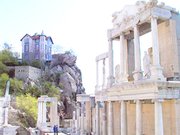Plovdiv
|
|
Plovdiv01.jpg
Plovdiv (Greek:Philippopolis, Φιλιππουπολης) is a city in Bulgaria and the capital of the Plovdiv Oblast (district). With a population of 376 785 (15 of September 2004), it is the country's second largest city (after the capital, Sofia). Tt is located in the Thracianlowland on the riverbanks of Maritsa river and The Seven Hills. The population is predominantly Bulgarian, though there is also Roma (Gypsy), Turkish, Hebrew and Armenian minority.
| Contents [hide] |
History
The history of Plovdiv reaches back 6,000 years, longer than either Athens or Rome, making it one of Europe's longest continually inhabited cities. Originally known as a Thracian city named Eumolpia, in 342 BCE it was conquered by Philip II of Macedon, father of Alexander the Great, who renamed it Philippopolis. It was later independent under the Thracians, who called it Pulpudeva (the translation of "Philippopolis"), until it was incorporated into the Roman Empire, under which it was called Thrimontium (City of Three Hills) and served as capital of the province of Thrace. Many Roman ruins can still be seen in the city.
The Slavs took the city in the 6th century and named it Puldin, and the Bulgars conquered it in 815. The name Plovdiv first appears in the 15th century.
Under Ottoman rule, Plovdiv was a major center of the Bulgarian nationalist movement, and the first Bulgarian language printing house was built in the city. While the city was liberated from the Ottomans during the Battle of Plovdiv in 1878, it was not originally part of the newly established Principality of Bulgaria. Instead it was the capital of the semi-independent Region of Eastern Rumelia, until that area finally joined Bulgaria in 1885.
Under communist rule since the end of World War II, Plovdiv was the center of that country's democracy movement, which finally overthrew the pro-Soviet regime in 1989.
Plovdiv hosted specialized exhibitions of the World's Fair three times (1981, 1985, and 1991).
Economy
Plovdiv is at the center of an important agricultural region, so that food processing is the most important industry. The city also produces machinery, textiles, and chemicals.
Sightseeings
- The Old Town
- The Ancient Theatre
- The Roman Stadium
- The Roman Forum
- The Roman Aqueduct
- The Eyrene Mosaic
- Forthress walls and Hisar Kapia
- The Ancient Synagogue
- Constantine and Helena Church
- "Sahat" hill and the Clock Tower
- Dzhumaya Mosque
- Turkish Bath (Art Gallery)
- Virgin Mary Church
- St. Petka Church
- st. Marina Church
- Tsar Simeon's Garden
- Main Street
- International Fair
- The Rowing Canal (Park for Sports and Recrration)
- Catholic Church in Plovdiv (http://www.blackseaestates.net/myfolder/images/Monasty/PicPlovdiv.htm)
Notable citizens of Plovdiv
- Hristo Stoitchkov, football player and coach
- Jordan Jovtchev, gymnast
- Milen Dobrev, weightlifter
- Maria Petrova, rhythmic gymnast
- Serafim Todorov, boxer
- Tzvetana Maneva, actress
- Milcho Leviev, musician and composer
- Stefka Kostadinova, world record holder in the women's high jump
- Svetlana Krivencheva, tennis player
- Georgi Karaslavov, writer
- Anjel Vagenstein, writer
- Asen Kisimov, actor
- George Ganchev, fencer, actor, writer, politician
Universities
- University of Plovdiv "Paisii Hilendarski"
- University of Food Technologies
- Agricultural University
- Technical University of Sofia, Branch Plovdiv
- Medical University
- Academy of Music, Dance and Fine Arts
See also
External links
- Plovdiv City Guide (http://www.plovdivguide.com/)
- Pictures from Plovdiv (the old town) (http://www.pbase.com/ngruev/plovdiv&page=all)
- International Fair - Plovdiv (http://www.fair.bg/en/)
- More Pictures from Plovdiv (http://www.blackseaestates.net/myfolder/images/HistoricBuildings/picPlovdiv.htm)
- Information for the potential investor in Plovdiv Region (http://www.blackseaestates.net/myfolder/towns/Regions/regPlovdiv.htm)
bg:Пловдив de:Plowdiw nl:Plovdiv pl:Płowdiw ru:Пловдив sv:Plovdiv

